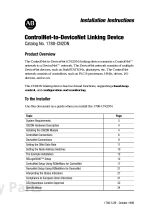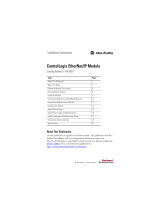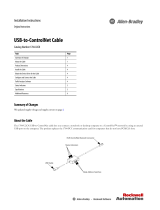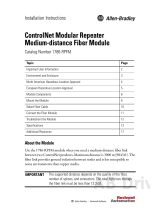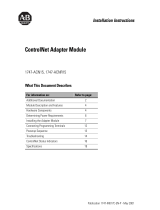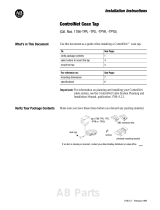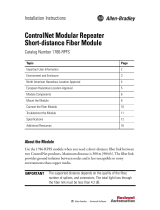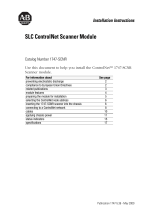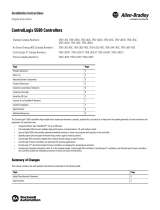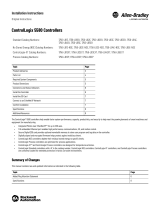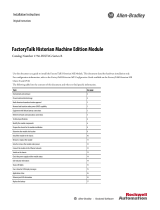La page est en cours de chargement...

Installation Instructions
Original Instructions
ControlLogix ControlNet Scanner Module
Catalog Numbers
1756-CNB, 1756-CNBK, 1756-CNBR, 1756-CNBRK
The ControlLogix® ControlNet scanner module establishes communication links between devices and is used for real-time, high-throughput
applications that require higher capacity and to speed up existing applications to run faster.
Topic Page
Set the Module Network Address 5
Determine Module Slot Location 5
Install the Module 5
Connect to the ControlNet Network 6
Connect to the Network with a Tap 6
Specifications 8
Additional Resources 8

2 Rockwell Automation Publication 1756-IN066A-EN-P - September 2017
ControlLogix ControlNet Scanner Module
ATTENTION: Read this document and the documents listed in the Additional Resources section about installation, configuration and operation of this equipment before you install, configure, operate or
maintain this product. Users are required to familiarize themselves with installation and wiring instructions in addition to requirements of all applicable codes, laws, and standards.
Activities including installation, adjustments, putting into service, use, assembly, disassembly, and maintenance are required to be carried out by suitably trained personnel in accordance with applicable code
of practice.
If this equipment is used in a manner not specified by the manufacturer, the protection provided by the equipment may be impaired.
注意:在安装、配置、操作和维护本产品前,请阅读本文档以及 “ 其他资源 ” 部分列出的有关设备安装、配置和操作的相应文档。除了所有适用规范、法
律和标准的相关要求之外,用户还必须熟悉安装和接线说明。
安装、调整、投运、使用、组装、拆卸和维护等各项操作必须由经过适当训练的专业人员按照适用的操作规范实施。
如果未按照制造商指定的方式使用该设备,则可能会损害设备提供的保护。
ATENCIÓN: Antes de instalar, configurar, poner en funcionamiento o realizar el mantenimiento de este producto, lea este documento y los documentos listados en la sección Recursos adicionales acerca de la
instalación, configuración y operación de este equipo. Los usuarios deben familiarizarse con las instrucciones de instalación y cableado y con los requisitos de todos los códigos, leyes y estándares vigentes.
El personal debidamente capacitado debe realizar las actividades relacionadas a la instalación, ajustes, puesta en servicio, uso, ensamblaje, desensamblaje y mantenimiento de conformidad con el código de
práctica aplicable.
Si este equipo se usa de una manera no especificada por el fabricante, la protección provista por el equipo puede resultar afectada.
ATENÇÃO: Leia este e os demais documentos sobre instalação, configuração e operação do equipamento que estão na seção Recursos adicionais antes de instalar, configurar, operar ou manter este produto. Os
usuários devem se familiarizar com as instruções de instalação e fiação além das especificações para todos os códigos, leis e normas aplicáveis.
É necessário que as atividades, incluindo instalação, ajustes, colocação em serviço, utilização, montagem, desmontagem e manutenção sejam realizadas por pessoal qualificado e especializado, de acordo com o
código de prática aplicável.
Caso este equipamento seja utilizado de maneira não estabelecida pelo fabricante, a proteção fornecida pelo equipamento pode ficar prejudicada.
ВНИМАНИЕ: Перед тем как устанавливать, настраивать, эксплуатировать или обслуживать данное оборудование, прочитайте этот документ и документы, перечисленные в разделе
«Дополнительные ресурсы». В этих документах изложены сведения об установке, настройке и эксплуатации данного оборудования. Пользователи обязаны ознакомиться с инструкциями по
установке и прокладке соединений, а также с требованиями всех применимых норм, законов и стандартов.
Все действия, включая установку, наладку, ввод в эксплуатацию, использование, сборку, разборку и техническое обслуживание, должны выполняться обученным персоналом в соответствии с
применимыми нормами и правилами.
Если оборудование используется не предусмотренным производителем образом, защита оборудования может быть нарушена.
注意 : 本製品を設置、構成、稼動または保守する前に、本書および本機器の設置、設定、操作についての参考資料の該当箇所に記載されている文書に目
を通してください。ユーザは、すべての該当する条例、法律、規格の要件に加えて、設置および配線の手順に習熟している必要があります。
設置調整、運転の開始、使用、組立て、解体、保守を含む諸作業は、該当する実施規則に従って訓練を受けた適切な作業員が実行する必要があります。
本機器が製造メーカにより指定されていない方法で使用されている場合、機器により提供されている保護が損なわれる恐れがあります。
ACHTUNG: Lesen Sie dieses Dokument und die im Abschnitt „Weitere Informationen“aufgeführten Dokumente, die Informationen zu Installation, Konfiguration und Bedienung dieses Produkts enthalten,
bevor Sie dieses Produkt installieren, konfigurieren, bedienen oder warten. Anwender müssen sich neben den Bestimmungen aller anwendbaren Vorschriften, Gesetze und Normen zusätzlich mit den
Installations- und Verdrahtungsanweisungen vertraut machen.
Arbeiten im Rahmen der Installation, Anpassung, Inbetriebnahme, Verwendung, Montage, Demontage oder Instandhaltung dürfen nur durch ausreichend geschulte Mitarbeiter und in Übereinstimmung mit
den anwendbaren Ausführungsvorschriften vorgenommen werden.
Wenn das Gerät in einer Weise verwendet wird, die vom Hersteller nicht vorgesehen ist, kann die Schutzfunktion beeinträchtigt sein.
ATTENTION : Lisez ce document et les documents listés dans la section Ressources complémentaires relatifs à l’installation, la configuration et le fonctionnement de cet équipement avant d’installer,
configurer, utiliser ou entretenir ce produit. Les utilisateurs doivent se familiariser avec les instructions d’installation et de câblage en plus des exigences relatives aux codes, lois et normes en vigueur.
Les activités relatives à l’installation, le réglage, la mise en service, l’utilisation, l’assemblage, le démontage et l’entretien doivent être réalisées par des personnes formées selon le code de pratique en vigueur.
Si cet équipement est utilisé d’une façon qui n’a pas été définie par le fabricant, la protection fournie par l’équipement peut être compromise.
주의 : 본 제품 설치 , 설정 , 작동 또는 유지 보수하기 전에 본 문서를 포함하여 설치 , 설정 및 작동에 관한 참고 자료 섹션의 문서들을 반드시 읽고 숙지하
십시오 . 사용자는 모든 관련 규정 , 법규 및 표준에서 요구하는 사항에 대해 반드시 설치 및 배선 지침을 숙지해야 합니다 .
설치 , 조정 , 가동 , 사용 , 조립 , 분해 , 유지보수 등 모든 작업은 관련 규정에 따라 적절한 교육을 받은 사용자를 통해서만 수행해야 합니다 .
본 장비를 제조사가 명시하지 않은 방법으로 사용하면 장비의 보호 기능이 손상될 수 있습니다 .
ATTENZIONE Prima di installare, configurare ed utilizzare il prodotto, o effettuare interventi di manutenzione su di esso, leggere il presente documento ed i documenti elencati nella sezione “Altre risorse”,
riguardanti l’installazione, la configurazione ed il funzionamento dell’apparecchiatura. Gli utenti devono leggere e comprendere le istruzioni di installazione e cablaggio, oltre ai requisiti previsti dalle leggi,
codici e standard applicabili.
Le attività come installazione, regolazioni, utilizzo, assemblaggio, disassemblaggio e manutenzione devono essere svolte da personale adeguatamente addestrato, nel rispetto delle procedure previste.
Qualora l’apparecchio venga utilizzato con modalità diverse da quanto previsto dal produttore, la sua funzione di protezione potrebbe venire compromessa.
DİKKAT: Bu ürünün kurulumu, yapılandırılması, işletilmesi veya bakımı öncesinde bu dokümanı ve bu ekipmanın kurulumu, yapılandırılması ve işletimi ile ilgili İlave Kaynaklar bölümünde yer listelenmiş
dokümanları okuyun. Kullanıcılar yürürlükteki tüm yönetmelikler, yasalar ve standartların gereksinimlerine ek olarak kurulum ve kablolama talimatlarını da öğrenmek zorundadır.
Kurulum, ayarlama, hizmete alma, kullanma, parçaları birleştirme, parçaları sökme ve bakım gibi aktiviteler sadece uygun eğitimleri almış kişiler tarafından yürürlükteki uygulama yönetmeliklerine uygun
şekilde yapılabilir.
Bu ekipman üretici tarafından belirlenmiş amacın dışında kullanılırsa, ekipman tarafından sağlanan koruma bozulabilir.
注意事項:在安裝、設定、操作或維護本產品前,請先閱讀此文件以及列於 「其他資源」章節中有關安裝、設定與操作此設備的文件。使用者必須熟悉安裝
和配線指示,並符合所有法規、法律和標準要求。
包括安裝、調整、交付使用、使用、組裝、拆卸和維護等動作都必須交由已經過適當訓練的人員進行,以符合適用的實作法規。
如果將設備用於非製造商指定的用途時,可能會造成設備所提供的保護功能受損。
POZOR: Než začnete instalovat, konfigurovat či provozovat tento výrobek nebo provádět jeho údržbu, přečtěte si tento dokument a dokumenty uvedené v části Dodatečné zdroje ohledně instalace, konfigurace
a provozu tohoto zařízení. Uživatelé se musejí vedle požadavků všech relevantních vyhlášek, zákonů a norem nutně seznámit také s pokyny pro instalaci a elektrické zapojení.
Činnosti zahrnující instalaci, nastavení, uvedení do provozu, užívání, montáž, demontáž a údržbu musí vykonávat vhodně proškolený personál v souladu s příslušnými prováděcími předpisy.
Pokud se toto zařízení používá způsobem neodpovídajícím specifikaci výrobce, může být narušena ochrana, kterou toto zařízení poskytuje.
UWAGA: Przed instalacją, konfiguracją, użytkowaniem lub konserwacją tego produktu należy przeczytać niniejszy dokument oraz wszystkie dokumenty wymienione w sekcji Dodatkowe źródła omawiające
instalację, konfigurację i procedury użytkowania tego urządzenia. Użytkownicy mają obowiązek zapoznać się z instrukcjami dotyczącymi instalacji oraz oprzewodowania, jak również z obowiązującymi
kodeksami, prawem i normami.
Działania obejmujące instalację, regulację, przekazanie do użytkowania, użytkowanie, montaż, demontaż oraz konserwację muszą być wykonywane przez odpowiednio przeszkolony personel zgodnie z
obowiązującym kodeksem postępowania.
Jeśli urządzenie jest użytkowane w sposób inny niż określony przez producenta, zabezpieczenie zapewniane przez urządzenie może zostać ograniczone.
OBS! Läs detta dokument samt dokumentet, som står listat i avsnittet Övriga resurser, om installation, konfigurering och drift av denna utrustning innan du installerar, konfigurerar eller börjar använda eller
utföra underhållsarbete på produkten. Användare måste bekanta sig med instruktioner för installation och kabeldragning, förutom krav enligt gällande koder, lagar och standarder.
Åtgärder som installation, justering, service, användning, montering, demontering och underhållsarbete måste utföras av personal med lämplig utbildning enligt lämpligt bruk.
Om denna utrustning används på ett sätt som inte anges av tillverkaren kan det hända att utrustningens skyddsanordningar försätts ur funktion.
LET OP: Lees dit document en de documenten die genoemd worden in de paragraaf Aanvullende informatie over de installatie, configuratie en bediening van deze apparatuur voordat u dit product installeert,
configureert, bediend of onderhoudt. Gebruikers moeten zich vertrouwd maken met de installatie en de bedradingsinstructies, naast de vereisten van alle toepasselijke regels, wetten en normen.
Activiteiten zoals het installeren, afstellen, in gebruik stellen, gebruiken, monteren, demonteren en het uitvoeren van onderhoud mogen uitsluitend worden uitgevoerd door hiervoor opgeleid personeel en in
overeenstemming met de geldende praktijkregels.
Indien de apparatuur wordt gebruikt op een wijze die niet is gespecificeerd door de fabrikant, dan bestaat het gevaar dat de beveiliging van de apparatuur niet goed werkt.

Rockwell Automation Publication 1756-IN066A-EN-P - September 2017 3
ControlLogix ControlNet Scanner Module
ATTENTION: Read this document and the documents that are
listed in the Additional Resources section about installation,
configuration, and operation of this equipment before you install,
configure, operate, or maintain this product. Users are required to
familiarize themselves with installation and wiring instructions in
addition to requirements of all applicable codes, laws, and
standards.
• Installation, adjustments, putting into service, use, assembly,
disassembly, and maintenance are required to be carried out by
suitably trained personnel in accordance with applicable code
of practice.
• In case of malfunction or damage, no attempts at repair should
be made. The module should be returned to the manufacturer
for repair. Do not dismantle the module.
• This equipment is certified for use only within the surrounding
air temperature range of 0…60 °C (32…140 °F). The
equipment must not be used outside of this range.
• Use only a soft dry anti-static cloth to wipe down equipment.
Do not use any cleaning agents.
IMPORTANT Any illustrations, charts, sample programs, and layout
examples shown in this publication are intended solely for
the purposes of example. Since there are many variables and
requirements associated with any particular installation,
Rockwell Automation does not assume responsibility or
liability for actual use based upon the examples shown in this
publication.
Environment and Enclosure
ATTENTION: This equipment is intended for use in a Pollution
Degree 2 industrial environment, in overvoltage Category II
applications (as defined in IEC 60664-1), at altitudes up to 2000 m
(6562 ft) without derating.
This equipment is not intended for use in residential environments
and may not provide adequate protection to radio communication
services in such.
This equipment is supplied as open-type equipment for indoor
use. It must be mounted within an enclosure that is suitably
designed for those specific environmental conditions that will be
present and appropriately designed to prevent personal injury
resulting from accessibility to live parts. The enclosure must have
suitable flame-retardant properties to prevent or minimize the
spread of flame, complying with a flame spread rating of 5VA or be
approved for the application if non-metallic. The interior of the
enclosure must be accessible only by the use of a tool. Subsequent
sections of this publication may contain more information
regarding specific enclosure type ratings that are required to
comply with certain product safety certifications.
In addition to this publication, see the following:
• Industrial Automation Wiring and Grounding Guidelines,
publication 1770-4.1
, for additional installation requirements.
• NEMA 250 and IEC 60529, as applicable, for explanations of the
degrees of protection provided by different types of enclosures.
Prevent Electrostatic Discharge
ATTENTION: This equipment is sensitive to electrostatic discharge,
which can cause internal damage and affect normal operation.
Follow these guidelines when you handle this equipment:
• Touch a grounded object to discharge potential static.
• Wear an approved grounding wriststrap.
• Do not touch connectors or pins on component boards.
• Do not touch circuit components inside the equipment.
• Use a static-safe workstation, if available.
• Store the equipment in appropriate static-safe packaging when
not in use.
Removal and Insertion Under Power
WARNING: When you insert or remove the module while
backplane power is on, an electric arc can occur. This could cause
an explosion in hazardous location installations.
Be sure that power is removed or the area is nonhazardous before
proceeding. Repeated electrical arcing causes excessive wear to
contacts on both the module and its mating connector. Worn
contacts may create electrical resistance that can affect module
operation.
Waste Electrical and Electronic Equipment (WEEE)
At the end of its life, this equipment should be collected separately from any
unsorted municipal waste.

4 Rockwell Automation Publication 1756-IN066A-EN-P - September 2017
ControlLogix ControlNet Scanner Module
North American Hazardous Location Approval
The following information applies when operating this equipment in hazardous
locations.
Informations sur l’utilisation de cet équipement en environnements dangereux.
Products marked "CL I, DIV 2, GP A, B, C, D" are suitable for use in Class I Division 2 Groups A, B, C,
D, Hazardous Locations and nonhazardous locations only. Each product is supplied with
markings on the rating nameplate indicating the hazardous location temperature code. When
combining products within a system, the most adverse temperature code (lowest "T" number)
may be used to help determine the overall temperature code of the system. Combinations of
equipment in your system are subject to investigation by the local Authority Having Jurisdiction
at the time of installation.
Les produits marqués "CL I, DIV 2, GP A, B, C, D" ne conviennent qu'à une utilisation en
environnements de Classe I Division 2 Groupes A, B, C, D dangereux et non dangereux. Chaque
produit est livré avec des marquages sur sa plaque d'identification qui indiquent le code de
température pour les environnements dangereux. Lorsque plusieurs produits sont combinés dans un
système, le code de température le plus défavorable (code de température le plus faible) peut être
utilisé pour déterminer le code de température global du système. Les combinaisons d'équipements
dans le système sont sujettes à inspection par les autorités locales qualifiées au moment de
l'installation.
WARNING:
Explosion Hazard –
• Do not disconnect equipment unless power has been removed or the
area is known to be nonhazardous.
• Do not disconnect connections to this equipment unless power has
been removed or the area is known to be nonhazardous. Secure any
external connections that mate to this equipment by using screws,
sliding latches, threaded connectors, or other means provided with this
product.
• Substitution of components may impair suitability for Class I, Division 2.
• If this product contains batteries, they must only be changed in an area
known to be nonhazardous.
AVERTISSEMENT:
Risque d’Explosion –
• Couper le courant ou s'assurer que l'environnement est classé non
dangereux avant de débrancher l'équipement.
• Couper le courant ou s'assurer que l'environnement est classé non
dangereux avant de débrancher les connecteurs. Fixer tous les connecteurs
externes reliés à cet équipement à l'aide de vis, loquets coulissants,
connecteurs filetés ou autres moyens fournis avec ce produit.
• La substitution de composants peut rendre cet équipement inadapté à une
utilisation en environnement de Classe I, Division 2.
• S'assurer que l'environnement est classé non dangereux avant de changer
les piles.
European Hazardous Location Approval
The following applies to products marked II 3 G. Such modules:
• Are Equipment Group II, Equipment Category 3, and comply with the Essential Health and Safety Requirements relating to the design and construction of such equipment
given in Annex II to Directive 2014/34/EU. See the EC Declaration of Conformity at http://www.rockwellautomation.com/products/certification for details.
• The type of protection is "Ex nA IIC T4 Gc" according to EN 60079-15.
• Comply to Standards EN 60079-0:2012, EN 60079-15:2010, reference certificate number LCIE01ATEX6020X.
• Are intended for use in areas in which explosive atmospheres caused by gases, vapors, mists, or air are unlikely to occur, or are likely to occur only infrequently and for short
periods. Such locations correspond to Zone 2 classification according to ATEX directive 2014/34/EU.
• May have catalog numbers followed by a "K" to indicate a conformal coating option.
WARNING: Special Conditions for Safe Use:
• This equipment shall be mounted in an ATEX Zone 2 certified enclosure with a minimum ingress protection rating of at least IP54 (in accordance with EN
60079-15) and used in an environment of not more than Pollution Degree 2 (as defined in EN 60664-1) when applied in Zone 2 environments. The enclosure
must be accessible only by the use of a tool.
• This equipment shall be used within its specified ratings defined by Rockwell Automation.
• Provision shall be made to prevent the rated voltage from being exceeded by transient disturbances of more than 140% of the peak rated voltage when
applied in Zone 2 environments.
• The instructions in the user manual shall be observed.
• This equipment must be used only with ATEX certified Rockwell Automation backplanes.
• Secure any external connections that mate to this equipment by using screws, sliding latches, threaded connectors, or other means provided with this
product.
• Do not disconnect equipment unless power has been removed or the area is known to be nonhazardous.

Rockwell Automation Publication 1756-IN066A-EN-P - September 2017 5
ControlLogix ControlNet Scanner Module
Set the Module Network Address
Use your fingers or a small screwdriver to set the network address
switches for the module. For modules in a standalone chassis, you must
specify a unique ControlNet network address; for modules in a
redundant chassis, you must specify the same address for the secondary
module that you specified for the corresponding primary module
Determine Module Slot Location
The figure Chassis Slot Numbering shows chassis slot numbering in a
4-slot chassis. Slot 0 is the first slot and is always the leftmost slot in the
rack (the first slot to the right of the power supply). You can use any
size ControlLogix chassis and install the module in any slot. You can
also install multiple ControlNet modules in the same chassis. You can
install as many modules as your power supply can accommodate (such
as the number for which the power supply is rated).
Chassis Slot Numbering
Install the Module
You can install or remove a module while chassis power is applied.
TIP You can select an address of 01 to 99 for modules in a
standalone chassis or 01...98 for modules in redundant
chassis. 00 is an invalid ControlNet network address.
IMPORTANT If you plan to install a redundant system, you must place the
primary and redundant modules in the same corresponding
slot in their respective chassis. For example, if you place a
1756-CNBR module in slot 3 (from the left) in the primary
chassis, you must also place a 1756-CNBR module in slot 3 in
the redundant chassis.
Side of Module
Front of Module
Top of Module
This module’s network
address is 23.
WARNING: When you insert or remove the module while
backplane power is on, an electric arc can occur. This could cause
an explosion in hazardous location installations.
Be sure that power is removed or the area is nonhazardous before
proceeding. Repeated electric arcing causes excessive wear to
contacts on both the module and its mating connector. Worn
contacts may create electrical resistance that can affect module
operation.
WARNING: If you connect or disconnect the communication cable
with power that is applied to this module or any device on the
network, an electric arc can occur. This could cause an explosion in
hazardous location installations.
Be sure that power is removed or the area is nonhazardous before
proceeding.
WARNING: The NAP port is intended for temporary local
programming purposes only and not intended for permanent
connection. If you connect or disconnect the NAP cable with power
that is applied to this module or any device on the network, an
electric arc can occur. This could cause an explosion in hazardous
location installations.
Be sure that power is removed or the area is nonhazardous before
proceeding.
Chassis
Power Supply
Slot 0
Slot 1
Slot 3
Slot 2

6 Rockwell Automation Publication 1756-IN066A-EN-P - September 2017
ControlLogix ControlNet Scanner Module
Follow these steps to install the module.
1. Align the circuit board with top and bottom guides in the
chassis.
2. Slide the module into the chassis.
Make sure that the module backplane connector properly
connects to the chassis backplane as shown.
Connect to the ControlNet Network
You can connect the module to the ControlNet network using a tap
(1786-TPR, 1786-TPS, 1786-TPYR, or 1786-TPYS) or a network
access cable (1786-CP).
The figure shows an example ControlNet network using redundant
media.
When connecting the module to a ControlNet network, also refer to
the following documentation:
• ControlNet Coax Tap Installation Instructions, publication
1786-5.7
• ControlNet Cable System Planning and Installation Manual,
publication CNET-IN002
Connect to the Network with a Tap
Perform the following steps to connect the module to the network
using a tap.
1. Remove and save the dust caps from the ControlNet network
taps.
ATTENTION: Do not force the module into the backplane
connector. If you cannot seat the module with firm pressure, check
the alignment. Forcing the module into the chassis can damage
the backplane connector or the module.
WARNING: If you connect or disconnect the
communications cable with power that is applied to this
module or any device on the network, an electric arc can
occur. This could cause an explosion in hazardous
location installations.
TIP Use the 1786-CP cable for temporary connections,
such as programming software. For permanent
connections, use a tap
Slide module into
chassis. Make sure
that the module
backplane
connector properly
connects to the
chassis backplane
Align the circuit board with
top and bottom guides in the
chassis.
Circuit
Board
The module is properly installed when it is flush with the power
supply or other installed modules.
TIP Taps with a straight connector (1786-TPS or
1786-TPYS) are recommended because of the
location of the BNC connectors on the bottom of the
module.
ATTENTION: Do not allow any metal portions of the tap to contact
any conductive material. If you disconnect the tap from the
module, place the dust cap back on the straight or right-angle
connector to help prevent the connector from accidentally
contacting a metallic grounded surface.
1756-CNBR, 1756-CNBRK Module
(in a 1756-A4 chassis)
ControlNet Network
Node
ControlNet Link
ControlNet
Node
Redundant Media
(optional)
Dust Cap
Segment 1
Segment 2
Dust Cap
1756-CNB, 1756-CNBK
1756-CNBR, 1756-CNBRK
Segments 1 and 2
Segment1

Rockwell Automation Publication 1756-IN066A-EN-P - September 2017 7
ControlLogix ControlNet Scanner Module
2. Connect the tap’s straight or right-angle connector to the
module BNC connector.
3. Apply power to the module and check module status.
Use the following flowchart as a guide.
If Your Node Supports Connect The Tap’s Connector
Non-redundant media
1756-CNB, 1756-CNBK
to the channel A connector on the module
(channel B on the 1756-CNBR, 1756-CNBRK is not used)
(1)
(1) While both channels are active, Rockwell Automation recommends using channel A for non-redundant
media.
redundant media
• from trunkline A to channel A on the 1756-CNBR,
1756-CNBRK
• from trunkline B to channel B on the 1756-CNBR,
1756-CNBRK
IMPORTANT To prevent inadvertent reversal of the tap connections
(resulting in incorrect status displays requiring
troubleshooting), check the tap drop cable for the label
indicating the attached segment before making your
connection.
To work properly, when you use modules in a redundant
control chassis pair, the primary and redundant partner
modules must be connected to the same network segment. If
you are using redundant media, connect the channel of each
partner to the same network segment.
Tap
Segment 1
Segment 2
Tap
Tap
A
A
B
Turn on the
chassis power
Module
status
indicator
red?
See the
Troubleshoot
section.
Module performs a
power-on self-test
initialization.
No
Yes
INIT
No
Yes
Module
status
indicator
red?
INIT has failed, and the
module displays an
error message. Refer to
Troubleshoot section.
Replace the module.
OR
WAIT
SRM
Modules are in a
redundant control
chassis pair.
Initialization is
complete. The
status indicator
blinks green.
Channel A and B
indicators alternately
update.
Channel A and B
indicators display the
network condition as
listed on page 28.
Module
status
displays
OK?
No
See the
Troubleshoot
section.
Yes
Module is functional
and operating.
OK
A#xx

Allen-Bradley, Rockwell Automation, ControlLogix, and Rockwell Software are trademarks of Rockwell Automation, Inc.
Trademarks not belonging to Rockwell Automation are property of their respective companies.
Rockwell Otomasyon Ticaret A.Ş., Kar Plaza İş Merkezi E Blok Kat:6 34752 İçerenköy, İstanbul, Tel: +90 (216) 5698400
Rockwell Automation maintains current product environmental information on its website at
http://www.rockwellautomation.com/rockwellautomation/about-us/sustainability-ethics/product-environmental-compliance.page
.
Publication 1756-IN066A-EN-P - September 2017 PN-460564
Supersedes Publication 1756-IN604-EN-P - February 2006 and 1756-IN571B-EN-P - April 2001 Copyright © 2017 Rockwell Automation, Inc. All rights reserved. Printed in the U.S.A.
Specifications
Additional Resources
These documents contain additional information concerning related products from Rockwell Automation.
You can view or download publications at http://www.rockwellautomation.com/global/literature-library/overview.page
. To order paper copies of
technical documentation, contact your local Allen-Bradley distributor or Rockwell Automation sales representative.
Rockwell Automation Support
For technical support, visit http://www.rockwellautomation.com/support/overview.page.
Attribute 1756-CNB, 1756-CNBK 1756-CNBR, 1756-CNBRK
Temperature, operating
IEC 60068-2-1 (Test Ad, Operating Cold),
IEC 60068-2-2 (Test Bd, Operating Dry Heat),
IEC 60068-2-14 (Test Nb, Operating Thermal Shock)
0…60 °C (32…140 °F)
Temperature, surrounding air, max 60 °C (140 °F)
Enclosure type rating
None (open-style)
Voltage and current ratings
Backplane:
• 5.1V DC, 970 mA
• 24V DC, 1.7 mA
Isolation voltage
30V (continuous), Basic Insulation Type, ControlNet A/B to Backplane
No isolation between NAP and Backplane
Type tested at 500V AC for 60 s
30V (continuous), Basic Insulation Type, ControlNet A/B to Backplane,
and ControlNet A to ControlNet B
No isolation between NAP and Backplane
Type tested at 500V AC for 60 s
North American temp code
T4A
ATEX temp code
T4
Resource Description
ControlNet Modules in Logix5000 Control Systems, publication CNET-UM001
Provides information on how to use ControlNet communication modules.
ControlNet Coax Media Planning and Installation Guide, publication CNET-IN002 Describes the required components of a ControlNet coax media system.
ControlNet Fiber Media Planning and Installation Guide, publication CNET-IN001 Provides basic information for fiber cable planning and installation.
Industrial Automation Wiring and Grounding Guidelines, publication 1770-4.1 Provides general guidelines for installing a Rockwell Automation industrial system.
Product Certifications website,
http://www.rockwellautomation.com/global/certification/overview.page
Provides declarations of conformity, certificates, and other certification details.
1/8

